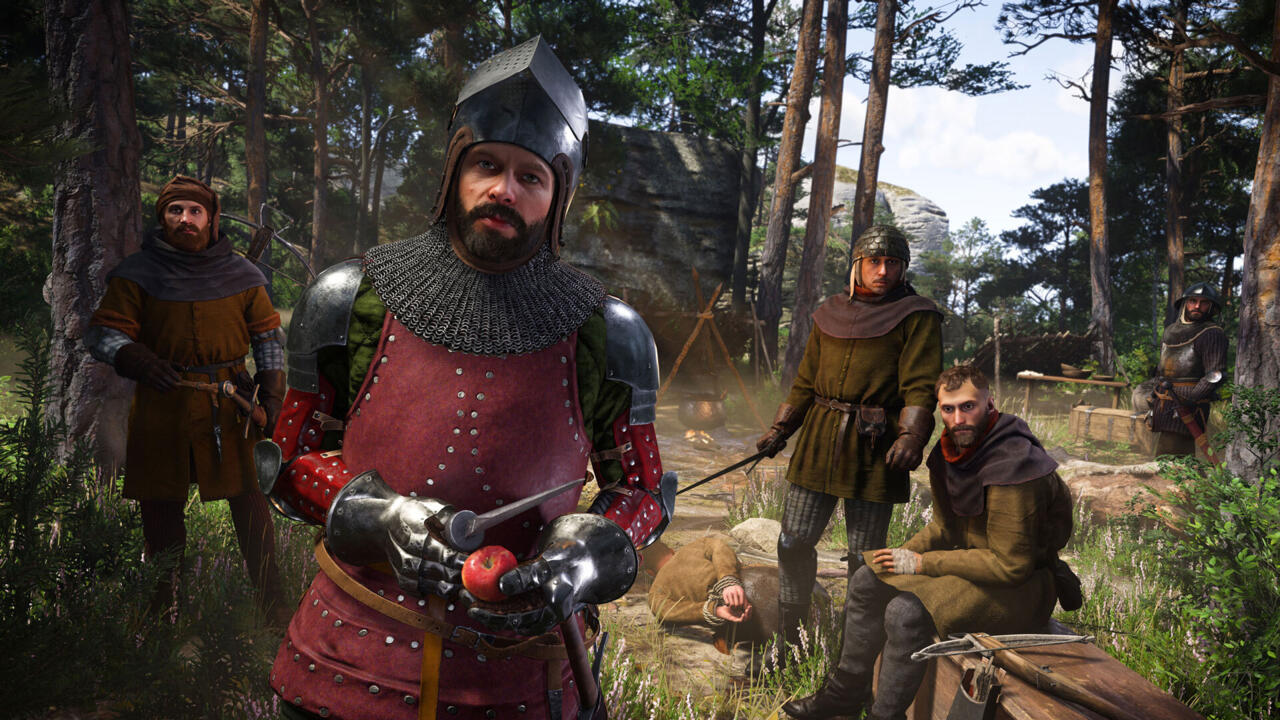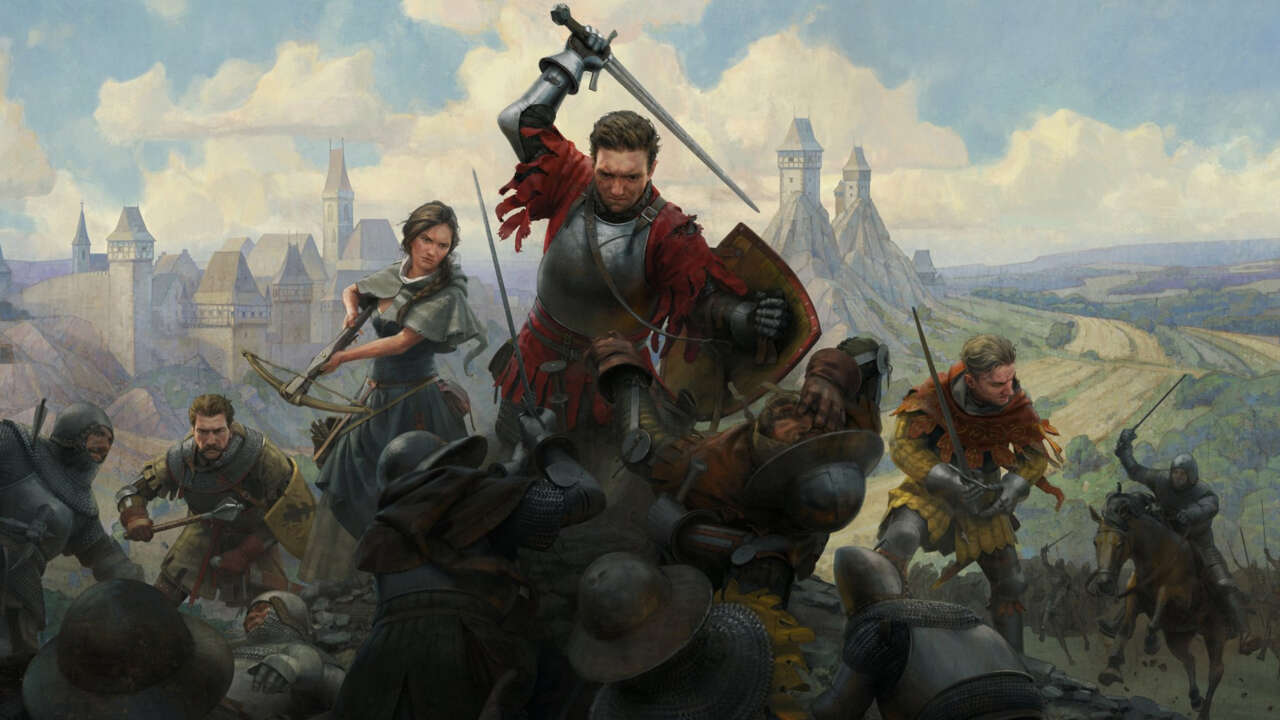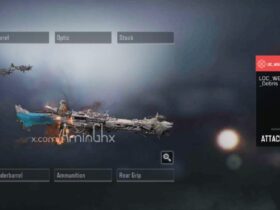There’s a tavern in the town of Troskowitz where the barmaids must be sick at the sight of me. I’ve been there twice, and both times been involved in messy brawls despite not tasting a lick of alcohol. The second of these fisticuffs was against a small group of Cuman deserters. They seemed nice enough, but I was still wary considering the Cumans are who killed my parents a few months back. I wasn’t the only one, and after failing to ease the growing tension, I decided to side with the local townspeople when push came to shove.
Needless to say, we didn’t put up much of a fight. Once the Cumans left, one of the locals implored me to track them down and deal with them once and for all. After eventually tracking them down, the sole Czech-speaking Cuman was so welcoming that I ended up getting drunk with them. I got so inebriated, in fact, that my night revolved around almost drowning, playing matchmaker for one of the soldiers, and then having a conversation with a talking dog that definitely wasn’t real. This night of revelry would’ve been fine on any other evening, but I promised two new acquaintances that I’d be up bright and early to join them on a critical mission. Even after sleeping for seven hours, I was still completely plastered when I arose from my stupor. And let me tell you, fighting bandits with blurred vision, a swaying body, and a soundtrack of frequent farting isn’t ideal.
To some, this last part might sound utterly infuriating. To me, and others like me, this is part of what makes Kingdom Come: Deliverance 2 utterly enticing. This is a game that sings when you’re swept up in an entertaining series of events ignited by the consequences of your actions; where the game’s quest design and emphasis on player choice wonderfully intertwine with its systems-driven sandbox to create a wholly immersive experience. While its 2018 predecessor was often disrupted by technical issues–which were further exacerbated by a frustrating save system–and clunky combat, Kingdom Come 2 refines and improves upon it in every respect. The obtuse nature of some of its RPG systems still won’t click for everybody, but this is a confident sequel that builds on the foundations established by the original game, presenting a rich and sprawling adventure that effortlessly oscillates between medieval drama and slice-of-life hijinks in a world that feels distinctly alive.
Set in Bohemia during the early 15th century, Kingdom Come 2 picks up right where the first game left off. You’re Henry of Skalitz, a humble blacksmith’s son who’s still trying to retrieve his murdered father’s sword from the sniveling noble who stole it–and also happens to be working for the other side in the region’s ongoing civil war. You begin the game as the handsomely equipped bodyguard of your pal, Sirs Hans Capon, but it doesn’t take long before things go awry and you’re left with little except for a few new scars. From here, Kingdom Come 2 is all about building yourself back up in whichever way you see fit. Will your Henry possess a silver tongue and scholarly knowledge? Will he be a skilled swordsman capable of defeating knights and bandits alike? A thief or a devout Christian? A drunken brawler or a master of apothecary? The most likely outcome is some confluence of all of the above, but the choice is entirely yours. Kingdom Come 2 is designed to accommodate the type of Henry you want to be, with the rest of Bohemia taking note and reacting in kind.
Every action you take feeds into the game’s robust progression system, where you get better at each discipline the more often you do it. Studying specific books for a few hours can expedite the process, but your proficiency with a sword will primarily improve by wielding one in battle, either in life-or-death skirmishes or friendly training duels. There are four primary stats to level up–strength, agility, vitality, and speech–but also numerous skills to master, from survival and thievery to craftsmanship and horsemanship. As the level of your stats and skills rise, you gain access to myriad perks that improve your capabilities even further. This might be something simple, like dodges in combat costing 40% less stamina, or something more significant, such as the ability to stealthily knock people out by putting them in a chokehold. Some of these can only be learned by certain characters teaching you–such as an expert thief letting you in on the secrets of pickpocketing–and the same is true of combos for the various weapon types you can equip. This creates an intuitive and tactile sense of progression where improvement isn’t predicated on simply watching numbers increase, but by learning and doing.
This is well demonstrated by the art of persuasion. You can solve even the most dire of situations by using Henry’s gift of the gab to reason with the other party. Depending on who you’re talking to, there are numerous ways to try resolving matters, such as peaceful means, issuing threats, lying, and so on. While speech is a stat you can level up like any other, it’s also influenced by a number of additional factors, such as your appearance and reputation. If you’re trying to come across as a hero and protector of the weak, you’ll want to be wearing a suit of armor to convincingly pull it off. Wearing noble attire will accentuate your charisma–provided you’re not covered in blood and filth. Mercifully, you can save up to three different outfits, quickly swapping between them like a chameleon, depending on the situation. Your attire can be advantageous or disadvantageous when it comes to stealth, too. Wearing dark clothes is preferable when sneaking around at night, while it’s inadvisable to wear armor plates due to the rattle each footstep emits.
If you’re caught breaking and entering, you’ll be greeted by the stiff arm of the law that is Kingdom Come 2’s fleshed-out crime system. You don’t even have to be caught red-handed to land yourself in trouble. If a valuable item goes missing or someone is murdered in their sleep and you were spotted lurking around the area beforehand, NPCs are smart enough to deduce that you might’ve had something to do with it. You can attempt to talk your way out of these situations, opt to pay a fine, accept your punishment, or try to run away. Depending on the severity of your crime, there are four possible punishments on hand, from spending a few days in the pillory to being painfully branded on the side of the neck. Each form of punishment makes it challenging to converse with people until the effect wears off or you decide to embark on a pilgrimage to atone for your sins. These consequences are impactful and ensure that each picked lock and stint of trespassing is fraught with tension, particularly because Kingdom Come 2’s contentious save system remains unchanged from the first game.
You can only save your progress by consuming a potion of Savior Schnapps or by sleeping in a bed you either own or have rented for the night. There are auto saves during quests, and you have the option to save and quit, but you’re otherwise limited on when and how often you can save the game. Savior Schnapps can be found, bought, or brewed, but there’s no way to save on the spot if you run out. The idea behind this is to eliminate save scumming, forcing you to live with the consequences of your actions. In the first game, however, the intent behind it was undermined by the prevalence of bugs and other technical issues, with some potentially wiping away hours of progress. Fortunately, Kingdom Come 2 is unlike its predecessor by being near-faultless in this regard. Playing on PC, I’ve not encountered any broken quests or game-breaking bugs in over 65 hours of playtime. I’ve witnessed a few visual hiccups, like characters clipping through tables or floating in the air, but these moments are relatively rare and constitute the extent of the game’s technical issues, in my experience.
This is a confident sequel that builds on the foundations established by the original game, presenting a rich and sprawling adventure that effortlessly oscillates between medieval drama and slice-of-life hijinks in a world that feels distinctly alive
It’s an impressive feat for such a large and complex game, especially one of such frequent beauty. The rolling hills of Bohemia stretch far beyond the horizon, with castles perched atop basalt rock formations casting long shadows onto fields of wheat and grazing cows. Verdant forests are thick with vegetation; the knee-high grass, flush with vibrant flowers like Marigold and Chamomile, tapers off as dense brush and towering trees take over. Sunlight occasionally peeks through the canopy, casting a luminous glow onto undulating streams of flowing water. Deer and rabbits scarper away, hunted by packs of howling wolves that shatter the hushed atmosphere of these medieval forests. Elsewhere, beyond the high walls of Kuttenberg, there exists a stark contrast to nature’s tranquility. Within the hustle and bustle of the city, merchants hawk everything from gambesons to cabbages, with cart tracks perforating the muddy streets and leaving behind manure from the horses dragging them along. The city’s denizens laugh over drinks in the city’s various taverns, argue with one another outside tailors and armorers, and relax in steamy bathhouses after a day at the steelworks. It genuinely feels like you’re peering into a window of the past, complemented by an exhaustive codex that details everything from the clothing and fashion of the time to various folk tales.
This meticulous eye for detail in the game’s visuals, sound design, and adherence to history is just as present in its RPG systems. Combat has been streamlined but is no less complex. It’s significantly more fluid and approachable compared to the first game, which makes sense story-wise, as you would expect Henry to have a better grasp of warfare. Combat uses a rosette that allows you to attack from either three or four directions, depending on the weapon type you’re using. You can slash from the left, right, and from above, while swords, halberds, and the like are capable of stabbing. Blocking attacks is as simple as holding down a button–provided you have enough stamina–but if you time it correctly, you can execute a perfect block and interrupt your opponent’s attack, allowing you to follow up with a riposte.
These are the basics of combat, but more formidable enemies require more expertise to defeat. Combos are a satisfying way to break through an opponent’s tough defense, yet it’s the Master strike that’s often the most effective. This is an advanced technique you can learn later on, which utilizes the same timing as a perfect block. Rather than simply deflecting an incoming attack, however, Master strikes follow up with an unblockable attack in one seamless motion, exploiting any weaknesses in your opponent’s armor. To execute a Master strike, you need to attack in the opposite direction of your opponent, challenging you to read their movements and react accordingly. If they attack from the left, you need to counterattack from the right. If they go for a stab, you need to respond with a strike from above. You also need to be wary of enemy soldiers countering your attacks with a Master strike of their own, creating this delicate dance as you trade ripostes and search for an opening.
Fighting multiple enemies at once is inherently chaotic by comparison, but emerging victorious is at least doable now. Kingdom Come 2’s enemy AI isn’t quite as aggressive as it was before, so you can avoid being overrun with clever positioning as you attempt to pick off enemies one by one. It still feels slightly awkward at times, but it helps that the lock-on system is much snappier. You can even flee from combat and live to fight another day, which wasn’t a possibility in the first game. The one glaring negative is that successful attacks against unarmored enemies lack the impact you might expect, with little distinction between slicing flesh and colliding with steel-plated armor. Combat is still regularly thrilling, especially when you factor in the various strengths and weaknesses of each weapon type–like maces being capable of breaking through armor–but it isn’t peerless.
Of course, while you can’t avoid combat altogether, Kingdom Come 2 offers enough flexibility that you can frequently venture down other avenues of success. Quests are open-ended, giving you multiple ways to reach a conclusion, with even failure functioning as an integral part of the experience, occasionally forcing you to approach situations differently. Sometimes, this comes down to player choice. Other times, it depends on what’s available to you. If you’re trying to track down a missing person, you might discover their last known location and then attempt to follow a trail of blood or footprints in the mud. However, if you’ve recovered Henry’s faithful canine companion, Mutt, you can give him a whiff of the missing person’s clothing and he’ll sniff them out.
Not only are your options varied, but so are the quests themselves. You’ll pose as a sommelier to learn a secret wine recipe, compete in a tournament as part of a sword-fighting brotherhood, engage in a petty rivalry between two neighboring villages, investigate a murder and attempt to catch a serial killer, and so much more. These quests are engaging and uniformly well-written and acted, with even minor characters tending to be fairly fleshed out. Kingdom Come 2 is also genuinely funny, frequently injecting a playful irreverence into its historical venture. Side quests often weave into the main story and other side activities, too, rewarding you not just with material gains but with a narrative pay-off and tangible sense of place.
It’s still slow-paced compared to its contemporaries, with some quests revolving around carrying sacks of grain and crafting weapons by gradually hammering heated steel on an anvil, but this is all part of its charm if you’re someone who can appreciate placid moments in service of worldbuilding and immersion. The only time this approach infuriated me was in relation to how selling items works. Most merchants lack the money to pay for everything you want to flog, so you have to embark on multiple trips to various shops, moving items back and forth between your horse and your person to avoid over-encumbrance. This is a process you’ll typically repeat every few hours, and I wish it weren’t the case.
There has, at least, been a concerted effort to make the game more diverse. The first game was criticized for lacking representation outside of a handful of Turkic Cumans. In Kingdom Come 2, there’s a Romani camp early on where you can pick up a few interesting quests pertaining to their beliefs and way of life. Various cultures are represented in Kuttenberg where you’ll find plenty of Germans and an authentic Jewish quarter, with plot points delving into what it was like for Jews living in a predominantly Catholic country. Women are more autonomous as well, taking on vital roles that veer outside the lines of the patriarchy. There’s still some sleaziness, but this is mainly reserved for those working in bathhouses, and even the women there are given slightly more characterization than the mere sexual objects they previously were.

Gallery
It’s not perfect, with the codex still needlessly describing the ideal woman of the time as “a thin, pale woman with long blonde hair, small rounded breasts, relatively narrow hips and a narrow waist.” And while there is a character hailing from Mali, Kuttenberg is also conspicuous for its scarcity of people of color, despite being a major trading city. You would expect a small population of merchants from places like the Middle East and North Africa to exist within its market stalls, so they’re notable for their absence.
While Kingdom Come: Deliverance 2 still stumbles in some aspects of its portrayal of 15th-century Bohemia, the shadow that lingered over the first game has mostly dissipated. This is a massively improved sequel in every other area, with better combat, quest design, and none of the technical issues that plagued the original. Not everyone will vibe with its slow-paced and oftentimes tedious approach, but those willing to meet it on its own terms will find a compelling open-world RPG that relishes in player agency and the consequences of your actions.








![Chronicles of the Wolf Review [Capsule Computers]](https://esportvoice.com/wp-content/uploads/2025/06/Chronicles-of-the-Wolf-Review-Capsule-Computers-370x250.jpeg)


Leave a Reply